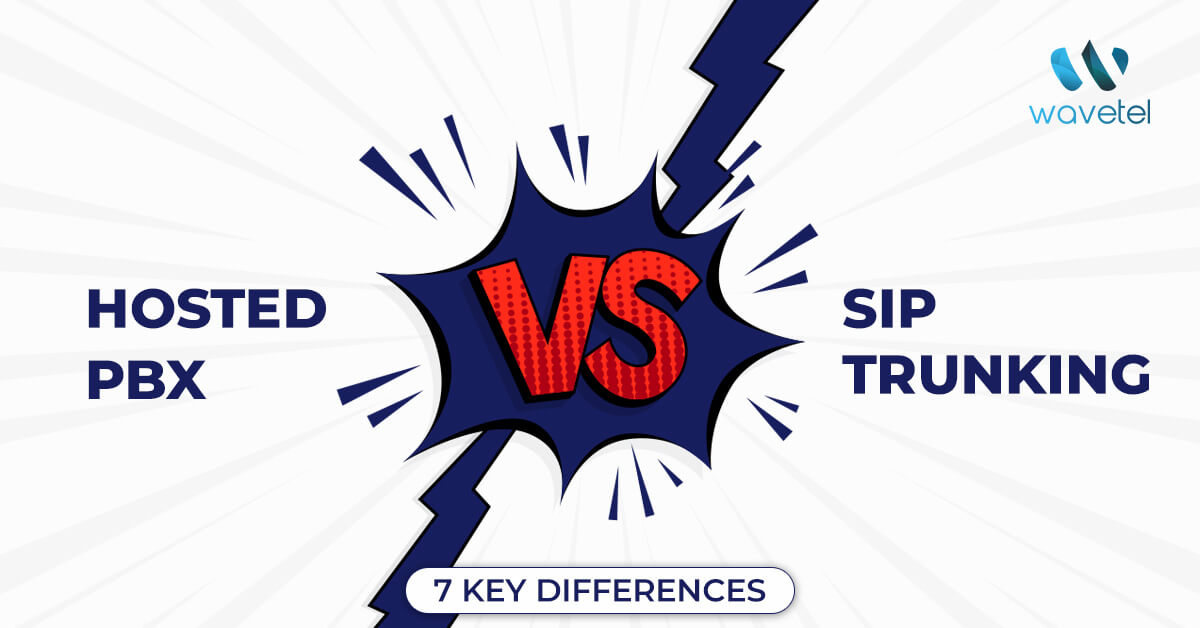
When it comes to upgrading your business communication system, understanding the differences between hosted PBX and SIP trunking is very important. From setup costs to security features, each option comes with its own set of advantages and considerations. Before looking into the seven key differences, we will understand what is hosted PBX and SIP trunking.
What is SIP trunking?
SIP trunking is a modern telecommunication solution that leverages the Session Initiation Protocol (SIP) to enable the connection of a Private Branch Exchange (PBX) to the internet. Unlike traditional phone lines, SIP trunking utilises an internet connection to facilitate voice and multimedia communication. It acts as a virtual link between your business and the telephone network, allowing for more flexible and cost-effective communication.
What is hosted PBX?
Hosted PBX, also known as a cloud or virtual PBX, is a phone system that operates on the cloud and is maintained by a third-party service provider. Unlike traditional PBX systems that require on-premise hardware, hosted PBX moves the entire phone system to the cloud. This means that your service provider manages the infrastructure, including servers and software, offering a more scalable and flexible solution.
7 key differences between hosted PBX and SIP trunking
Difference #1: Setup costs and hardware
Hosted PBX setup
Setting up a hosted PBX system requires phones, routers, and broadband service. The advantage lies in not having to invest in PBX servers, as your service provider manages them. This cloud-based technology can significantly reduce initial setup costs, possibly ranging from several hundred dollars, depending on factors like the number of users and required equipment.
SIP trunking setup
SIP trunking involves different costs, particularly if you already have on-premise PBX equipment. Transitioning from legacy PBX technology may require additional investments in a VoIP gateway, with potential costs ranging from $500 to $2000. If you have no existing PBX equipment, hosted PBX tends to be the more cost-effective option, but SIP trunking can be beneficial if you aim to repurpose current infrastructure.
Difference #2: Ongoing monthly fees
Hosted PBX costs
Hosted PBX providers offer various packages charging per user or specific features.
SIP trunking costs
SIP trunking services may charge per channel or offer flat monthly rates. Factors like the number of channels, rates per call, and any additional features are considered when comparing ongoing costs.
Difference #3: Call quality
Hosted PBX call quality
Hosted PBX relies on internet connectivity, making stable connections crucial for call quality. Factors like concurrent calls, codec usage, and internet speed influence the quality, emphasising the importance of wired connections.
SIP trunking call quality
SIP trunking utilises existing IP networks, ensuring high call quality. It offers dedicated lines and backup connections, relying on carrier networks for superior reliability.
Difference #4: Upgrades and maintainance
Hosted PBX upgrades and maintainance
With hosted PBX, your provider manages server and software maintenance, handling technical challenges like outages and upgrades. Internal changes, such as adding users or features, are the extent of your responsibilities, eliminating the need for in-house technical expertise.
SIP trunking upgrades and maintainance
SIP trunking requires local PBX equipment maintenance by your IT team. This involves updates, troubleshooting, and potentially hiring or retaining an IT manager, increasing recurring costs.
Difference #4: Scalability
Hosted PBX scalability
Hosted PBX suits small businesses with up to 20 employees, offering cost-effective and self-contained solutions. However, rapid expansion may necessitate considering alternative options.
SIP trunking scalability
SIP trunking benefits larger businesses with over 20 employees, providing flexibility and security for future expansion plans. It allows for reusing existing PBX equipment and offers precise channel selection.
Difference #5: Flexibility
Hosted PBX flexibility
Hosted PBX allows remote access through internet-based features, supporting web phones, VoIP apps, and softphones. Ideal for companies with dispersed or remote teams, it ensures reliable communication wherever employees are located.
SIP trunking flexibility
SIP trunking offers unlimited connectivity, supporting remote and mobile workers. It provides dedicated home phone mapping for home office workers, ensuring accessibility with a single phone number.
Difference #7: Compliance and security standard
Hosted PBX compliance
Security in hostedPBX relies on the provider’s solutions, leaving ports open for communication. The provider ensures compliance and security standards, but the potential for security issues exists.
SIP trunking compliance
SIP trunking provides superior security by running a dedicated connection, reducing bandwidth usage. The onus is on your company to maintain security standards, but redundant components and backup systems enhance infrastructure security.
To sum up
Choosing between hosted PBX and SIP trunking demands a thoughtful consideration of specific business needs. Hosted PBX excels in cost-effective setup, ease of maintenance, and is ideal for smaller enterprises. On the other hand, SIP trunking offers superior scalability, call quality, and security, catering to the demands of larger businesses with diverse communication needs.
As you navigate these key differences, align your decision with factors such as company size, geographical flexibility, and the existing PBX infrastructure. Ultimately, the optimal choice hinges on striking the right balance between functionality, cost efficiency, and future scalability for seamless business communication.

Tech Hub Digital, a one-stop destination for complete technology-related information.

